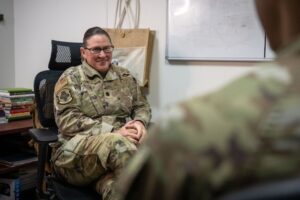
Story by Senior Airman Zachary Foster
United States Air Forces Central
U.S. CENTRAL COMMAND AREA OF RESPONSIBILITY – The hardest part of a deployment is being away from loved ones, but service members deployed to the U.S. Central Command area of responsibility are never truly alone.
The 379th Air Expeditionary Wing hosts a variety of resources solely dedicated to helping Airmen combat the struggles of deployment. Depending on the needs of the Airman, resources like the Chaplains Office and the Military and Family Readiness Center provide introductory care.
The next level of care, and the highest level at the 379th AEW, is a visit to the 379th Expeditionary Medical Squadron mental health flight.
“Our goal is to find ways to support people’s resilience,” said the 379th EMDS mental health clinical psychologist. “We really want to optimize the human weapons system and look at how we can best support people so they can do their job more effectively.”
The team of three providers and two technicians has a full walk-in schedule designed to be as conducive to the customer as possible. According to the 379th EMDS director of psychological health, the flight intends to flex to the needs of the individual. Whether it be sleep or stress, the mental health flight has the resources for each unique circumstance.
“The number one risk factor for suicide is isolation,” said the clinical psychologist. “One of our main focuses is promoting social communication, building those social networks across base.”
One of the most effective ways the clinic has built these connections is with their weekly classes. Twice a week, the flight invites service members from across the installation to participate in an open forum focused on building better sleep habits and reducing stress.
The flight is even taking a proactive approach to caring for Airmen with visits to high-stress units. According to the 379th EMDS director of psychological health, these visits aim to familiarize service members with representatives from helping agencies, forming a connection before they need help.
“Instead of waiting for Airmen to come see us, we go to see them,” said the clinical psychologist. “In the units where there are significant work demands, it’s difficult for them to make the trip to the clinic, but we can go meet them. We’ve developed training for sleep, stress, communication – anything we can do to address the concerns units are feeling.”
The clinic often leaves Airmen with advice from Dr. Steven Hayes, a leading industry psychologist, “mental breaks prevent mental breakdowns.” According to the 379th EMDS director of psychological health, it’s in the best interest of everyone to pause often and take time to rest and recover rather than pushing through to the point of mental exhaustion.
To schedule a training or for more information about the 379th EMDS mental health flight call 318-455-5227.